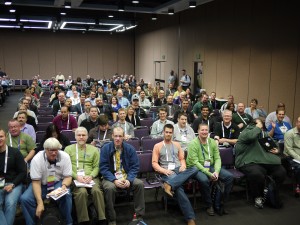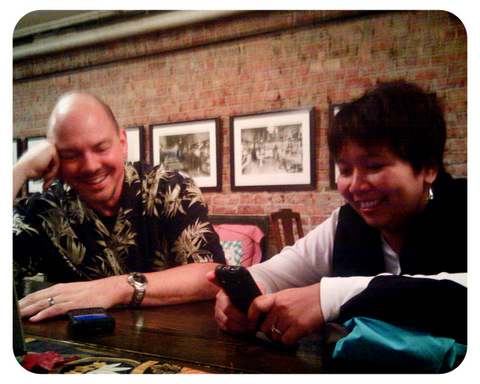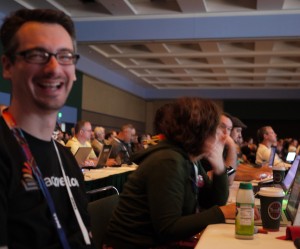The Professional Association for SQL Server (PASS) holds a summit every year where thousands of database professionals gather to learn about the latest developments from Microsoft, meet their fellow community members, and drink Jägermeister. This year, there’s a new way to help shape the PASS Summit – you can vote on the sessions you’d like to see.

Here’s the sessions we’re submitting this year along with some personal notes about why we’d like to present ’em.
“And Then It Got Even Worse”… Great Mistakes to Learn From (Panel Discussion- Vote)
Brent says: Nobody calls me when things are going well. When my phone rings, the poop has already hit the fan. My favorite disaster was when we found out that the redundant air conditioners…weren’t. This wouldn’t be so bad except that it was in the middle of summer in South Florida. It was a Sunday, so it took us a while to drive into the office. We tried opening the datacenter doors to help cool things off, but then we realized that since it was Sunday, the office air conditioners were turned off too. Good times. In that story, I’ll talk about why RAID 5 still isn’t enough for serious data protection.
Tim says: I was one of those accidental DBAs everyone talks about 12 years ago. Then things got busy, really busy. Now I find myself going back and fixing all the poor decisions made by the DBA who was learning on the job: Me.
Jeremiah says: I’ve written my share of bad code, recovered downed servers on 2 hours of sleep, and had every SQL Server upgrade go horribly wrong. It’s good to learn from your own mistakes, but it’s even better to learn from someone else’s.
Kendra says: It’s funny, when everything goes terribly wrong, you’ve got to stay very calm but also think fast. More than once I’ve had a situation go south where I thought of a story someone told me– and it saved the day.
BLITZ! The SQL – More One Hour SQL Server Takeovers by Brent (Vote)
Brent says: “You’re the database guy, right? We’ve got this SQL Server that’s been under Johnny’s desk. Everybody’s using some app on here. It’s yours now. Kthxbai.” DAMMIT, that sucks. I hate those moments as a DBA. Suddenly I had a completely new – or rather, completely old and busted – server that I had to manage. No backups, no documentation, no security, all problems. I built my Blitz script to take over servers faster and easier, and last year at the 24 Hours of PASS, I shared it with you in an all-demo session. Today, I’m a consultant, and I have to rapidly assess SQL Servers several times a week. I’ve built a new version of the script that does it harder, better, faster, stronger, and if this session is picked, I’ll give it to you at the Summit.
Tim says: I’ve been using variations on this script for a couple years now. It continues to save my bacon and make me look like a superstar in the office.
Jeremiah says: I had a collection of scripts for years that did something almost like what the Blitz script can do. I can’t say enough great things about this session.
Kendra says: ZOMG, he’s giving this away?

Consolidation is NOT a 4-Letter Word by Tim (Vote)
Tim says: I’ve been given a VM farm to fill with SQL Servers. So how do I decide what instances and databases I’m virtualizing and consolidating? I USE THE MATHS! Dynamic Management Objects, system objects, and the like are all tools I’m using in the process. I’m not going to talk about how to consolidate. This is about how to come up with the numbers to work your load balancing Mojo.
Brent says: I got a four-figure bonus from my boss’s boss after I showed how to consolidate a bunch of crappy old servers onto one brand new server. I saved over half a million dollars in licensing, made my own job easier, and paid off my Jeep. How cool is that?
Jeremiah says: When I was a production DBA, I frequently said “The less I have to manage the better.” Consolidation made my job much easier because I had to worry about less licenses, fewer servers, and less things that can break.
Kendra says: Consolidation is terrifying. What if it all goes horribly wrong in six months, which is when you can’t get more hardware? What you need is a method to figure things out.
How StackOverflow Scales with SQL Server by Brent and Kyle Brandt (Vote)
Brent says: I remember back in 2007 when I went to my first PASS: I loved the session on MySpace’s SQL Server infrastructure. I’ve been helping out with StackOverflow’s databases for a couple of years now, and one day I was just thinking to myself, “Wow, this stuff’s getting pretty big. Maybe we should talk about it at PASS?” I asked Kyle Brandt (Blog – ServerFault – @KyleMBrandt) if he’d like to co-present a session with me about the magic behind the scenes.
Kendra says: This session is so full of win. I’ve worked with Brent and Kyle together and they’ve mastered a complex and dynamic environment. They’ve faced common challenges that happen to many companies, and they’ve managed to conquer the problems without breaking the bank.
No More Bad Dates: Best Practices for Working with Dates and Times by Kendra (Vote)
Brent says: I remember the first time my company grew into multiple time zones. Suddenly GETDATE() on one server didn’t match GETDATE() on another server, and all our reporting tables had to be reworked. Whoops. <sigh> Now what? Do I store it in UTC? Do I change all my server clocks to UTC, or do I use offsets? Why is this stuff so hard?
Jeremiah says: Temporal data has always been tricky to deal with. The new data types make life much easier for DBAs, developers, and end users alike.
Kendra says: After working with TSQL for many years I realized there are a lot of intricacies to dates and times that you don’t see until you’ve mucked things up a bit. It all seems easy from afar, but once you get your hands dirty it’s a different story. Who knew language settings were a big deal for dates? Who knew computed columns with dates were picky? What do you mean, TIMESTAMP isn’t a stamp with a time? I pulled together all the wackiness, gotchas, and oh-look-at-that’s into this talk to save *you* some time.
Performance Through Isolation: How Experienced DBAs Manage Concurrency by Kendra (Vote)

Brent says: WITH (NOLOCK) only gets you so far, buddy. Time to cowboy up.
Tim says: Is ANTI-SERIALIZABLE an isolation level?
Jeremiah says: I like it when I get the rows in wrong the order, or twice, or twice, because of isolation I like it when I get level tricks.
Kendra says: Each time I give this presentation I’m amazed at how important it is to manage transaction isolation properly in an active environment, and how easy it is to misunderstand how things work– I’ll give you steps to manage concurrency that will save you loads of trouble.
Rewrite Your T-SQL for Great Good by Jeremiah (Vote)
Jeremiah says: Rewriting T-SQL is not the most glamorous way to make your database faster, it’s not always the easiest way to make your database faster, but it’s frequently the most rewarding way to make your database faster. Over the course of my career I’ve written a lot of bad T-SQL. I’ve re-written even more bad T-SQL to make applications run faster. Sometimes I even had to rewrite the code in ways that didn’t make sense to me as a developer but it made perfect sense for the database. I learned a lot but I always felt like there should be more information about this topic.
This session focuses on real problems I’ve faced, real patterns I’ve uncovered, and real solutions I’ve used to make things faster.
Brent says: Just because your T-SQL runs doesn’t mean it runs fast. Most of the time, this is completely okay, but every now and then you need to rewrite a working query to make it fly. That’s where Jeremiah comes in: we do this constantly. Learn from people who make a living doing this.
Tim says: So recently when I ran across a trigger that included a WAITFOR DELAY in order to resolve a timing issue with a GUID Primary Key in a child table that may have been bad code? (And unfortunately I’m not making that up for the sake of humor. Sadly they had removed the GUID Primary Key over two years ago but left the unnecessary WAITFOR DELAY. Easily fixed with a couple hyphens. I’m sure Jeremiah will lift heavier in this session.
Kendra says: This isn’t about putting lipstick on a pig– it’s about making your pig glow with health. Jeremiah will teach you more than tricks or how to use flashy features. Instead, he’ll teach you how to systemically improve your application performance.
Rules, Rules, and Rules by Jeremiah (Vote)
Jeremiah says: I like digging into something and figuring out how it works. When I first started working with databases, I thought that this was a pretty easy way to store and retrieve data. The more I learned about databases, the more I became fascinated by the way they worked. As I started digging into databases, I discovered that the most fascinating part of a database wasn’t really the database itself, it was the underlying software. To keep learning and understanding more about how databases work, I dug into the computer science that makes them tick.
There’s a lot of theory out there, some of it’s only applicable when you’re writing a database, but a lot of it can be applied and can help you make your life as a database professional easier. If you’re half as interested in this as I am, you’ll get a kick out of this session.
Brent says: if you like Dr. DeWitt’s keynotes diving into the technology side of databases, but you’re not quite sure how to relate that back to your own job, this is the session for you. Jeremiah likes reading database source code in his spare time, and he can show you how things like drive rotational speeds influence your schema designs.
Kendra says: Jeremiah’s unusual because he’s been a full time developer, a full time DBA, and a full time consultant. This has given him a big-picture view of systems from the spindles to the compiler, but with a practical twist. This is a great talk, and it’ll set you up to engineer better applications.
SELECT Skeletons FROM DBA_Closet by Tim (Vote)
Brent says: Experience is a fancy word for someone who’s made a lot of mistakes. Tim’s experienced, and he’ll talk about his educational opportunities so you can be experienced too – but without all the burn marks.
Tim says: I was the King of Cursors and Prince of Linked Servers when I was learning by successful failing earlier in my career. This public trousering hopefully provides some redemption. If not then it wouldn’t be the first time I’ve made a fool out of myself in public.
Jeremiah says: I can’t wait to learn about all of the skeletons that Tim is going to bring into the open, mainly so I can laugh along with him at the mistakes we’ve both made.

Seven Strategic Discussions About Scale by Kendra (vote)
Brent says: Want to amp up your career? Like reading stories on HighScalability.com? Kendra’s got experience with huge systems and a talent for communicating. If you’re frustrated with a crappy app design, she can help you convince your fellow developers, DBAs, and the people holding the checkbook. It’s really, really hard to find good training on big, high-performance systems, and you can get it for free in this session.
Jeremiah says: The best way to learn about scaling is to do it wrong and then do it right. The next best thing is to learn from someone who’s worked on massive databases and who is willing and able to share that information with you.
Kendra says: After years of experimentation, I’ve figured out how to sell a good idea: honestly, but with great data and timing. For any given issue, there are concrete things you can do to be more persuasive. Here’s how to find the right change for your systems, and the data which will get your message through.
Storage Triage: Why Your Drives Are Slow by Brent (Half-Day Session – Vote)
Brent says: This year, PASS let us submit 4-hour sessions for the first time. I’m really excited about this because there’s some sessions I just can’t cover in an hour. Very often when I’m called into clients, the SAN administrator is getting thrown under the bus. I need to quickly figure out who’s really at fault – is storage slow, or is storage slow because we’ve got memory or query problems? In this session, I’ll explain my diagnosis decisions to help relieve storage pains, and I’ll give attendees a poster with my decision tree.
Jeremiah says: I wish I’d had a session like this when I started learning about storage. Heck, I still wish I could go to a session like this. Storage is a critical component of SQL Server performance – getting it right is key.
Kendra says: Trust me: you want to be friends with your SAN admin. This talk will set you up so you only bring your SAN administrators problems that they can solve, with data that makes sense. If you can do that regularly then you’ll have an ally on your side when things go wrong, and that can really save the day.
The Database is Dead, Long Live the Database by Jeremiah (Vote)
Jeremiah says: We’ve all supported application features that we knew shouldn’t be in a relational database. Sometimes, you just have to suck it up and do what you can to keep that SQL Server running, right? It turns out that there are a lot of other ways to get things done and some of them work a lot better than storing data in SQL Server. This is something that I learned the hard way while performance tuning different applications – you need to pick the right tool for the job. I’ve struggled with trying to make a solution fit into a relational database and perform well. Sometimes, it just doesn’t work out.

You’re going to love learning about the mistakes I’ve made and how I’ve solved them, sometimes in novel ways.
Brent says: You’ve got that one app you keep swearing at because it performs horribly in SQL Server. It uses too much space, it tries shredding XML in every query, or it never gets queried period. Turns out it shouldn’t be in SQL Server to begin with, and Jeremiah can help you see the alternatives. They’re a lot easier (and cheaper) than you think.
The Other Side of the Fence: Lessons Learned from Leaving Home by Jeremiah (Half-Day Session – Vote)
Jeremiah says: I worked at Quest for a while as an Emerging Technology Expert. My job was to take a look at different databases and investigate how they could benefit businesses. I made some mistakes and had to re-learn a lot of things before I could start making sense of things. There’s more to it than learning new features and ways of doing things – by getting outside of my comfort zone, I had to make sure that I really understood how SQL Server operated in order to compare and contrast it to other databases.
Unlike The Database is Dead, Long Live the Database, this talk is all about different features in SQL Server, how they work, and why they got that way.
Brent says: Jeremiah likes to experiment. He’s a SQL Server guy who’s been playing doctor with several other database platforms. I love talking to him about how SQL Server does stuff because he can relate it in terms of how PostgreSQL or Hadoop do it. I don’t have the time to become an expert on those other platforms, but the things he teaches me about them help open my eyes about how I can do things differently in SQL Server.
Kendra says: Jeremiah and I talk about different database platforms often. Working with different platforms is like travel: you understand your home in a deeper way after you’ve been elsewhere.
The Periodic Table of Dynamic Management Objects by Tim (Vote)
Brent says: Tim’s poured a lot of work into making DMVs easier to understand. His introduction for this session says it all – “It’s time to have fun… WITH SCIENCE!” I love this session idea.
Tim says: I’m having a lot of fun with what started as a way for me to exercise my creative demons. We’ll go over the namesake poster and learn some interesting tricks using Dynamic Management Objects. We’ll also play some games to reinforce what you’ve learned. Like the abstract says: “It’s time to have fun… WITH SCIENCE!”
Jeremiah says: I was so excited when Tim swore me to secrecy and showed me an early draft of his poster. There a lot of DMVs and Tim figured out a great way to communicate meaningful information about them all.
Kendra says: You know how you thought Chemistry class was going to be all math, but then you got to light things on fire and blow some things up in the parking lot? You wanna be here for this one.
Top 10 Crimes Against Fault Tolerance by Kendra (Vote)

Brent says: When I first talked to Kendra before SQLCruise 2010, I loved hearing about the scale and flexibility of the servers she was working with. Multi-terabyte databases behind load balancers for constant uptime? Your ideas are intriguing to me and I wish to subscribe to your newsletter. If she’s that serious about data warehouse uptime, I’d love to see her tricks for everyday databases!
Kendra says: This talk is all about the important things that are much easier to do at the beginning. When you’re first designing an application or a service and you’re creating new databases, there are ways you can vastly reduce your recovery time down the road. As time passes, it’s much harder to make changes to add these things in. This is a list you can live by.
Virtualization and SAN Basics for DBAs by Brent (All-Day Pre-Con – Vote)
Brent says: I’ve given this all-day session at SQLbits in the UK and Connections in Orlando to rave reviews, and my clients frequently bring me in to give this same session to their DBAs, VMware admins, and SAN admins. I help get everyone on the same page so they don’t try to throw each other under the bus.
Tim says: Brent has presented on this topic on SQL Cruise and each time I walk away with more things to try back in the “Real World”.
Jeremiah says: Every time I talk to Brent about SAN or virtualization, I come away feeling smarter that I was before.
Kendra says: This session gives you the foundation you need to make it through every day comfortably– it’s like permanent clean underwear. We all need that, don’t we?
Sound Interesting? Vote For Us!
You can vote for the sessions you’d like to see here. Vote before midnight Pacific on May 20th.


1 Comment. Leave new
Great idea to get this all together in a blog post. 🙂 Makes voting for these killer sessions so easy. REALLY hope Kendra’s session on Performance through Isolation makes it I’m looking forward to that one.
pat